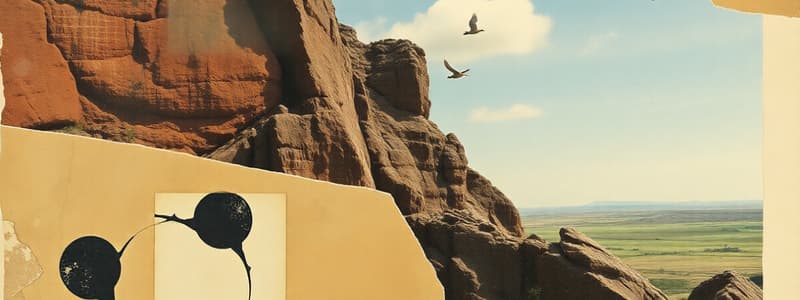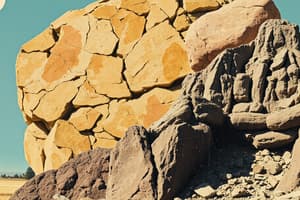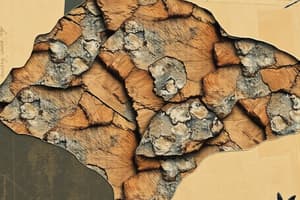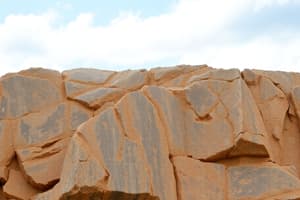Podcast
Questions and Answers
What is the primary process of mechanical weathering?
What is the primary process of mechanical weathering?
- Chemical reactions with minerals
- Breakdown of rocks by physical forces (correct)
- Mixing of rocks with atmospheric gases
- Formation of iron oxide from rust
How does exposure to the atmosphere affect weathering?
How does exposure to the atmosphere affect weathering?
- It prevents physical weathering from occurring.
- It protects rocks from temperature fluctuations.
- It decreases the surface area for chemical reactions.
- It accelerates weathering by widening cracks. (correct)
Which mineral found in rocks is particularly reactive with oxygen?
Which mineral found in rocks is particularly reactive with oxygen?
- Magnesium
- Quartz
- Iron (correct)
- Calcium
What role does saliva play in the analogy of weathering?
What role does saliva play in the analogy of weathering?
Which factor is NOT mentioned as influencing the rate of weathering?
Which factor is NOT mentioned as influencing the rate of weathering?
What happens when ice expands within the cracks of rocks?
What happens when ice expands within the cracks of rocks?
What is a characteristic of minerals that weather more rapidly?
What is a characteristic of minerals that weather more rapidly?
Why can rust be easily penetrated by a finger?
Why can rust be easily penetrated by a finger?
Which mineral is particularly vulnerable to chemical weathering?
Which mineral is particularly vulnerable to chemical weathering?
What effect does a warmer climate have on chemical weathering?
What effect does a warmer climate have on chemical weathering?
How does porosity in rocks affect weathering rates?
How does porosity in rocks affect weathering rates?
In which climate would limestone weather the fastest?
In which climate would limestone weather the fastest?
What role does carbonic acid play in the weathering of calcite?
What role does carbonic acid play in the weathering of calcite?
Which of the following statements is true regarding mineral hardness and weathering?
Which of the following statements is true regarding mineral hardness and weathering?
Which environmental factor besides mineral type affects the rate of weathering?
Which environmental factor besides mineral type affects the rate of weathering?
Flashcards
Weathering
Weathering
The mechanical or chemical breakdown of rocks.
Mechanical Weathering
Mechanical Weathering
The physical breakdown of rocks into smaller pieces.
Chemical Weathering
Chemical Weathering
The breakdown of rocks by chemical reactions.
Atmospheric Exposure
Atmospheric Exposure
Signup and view all the flashcards
Rock Composition
Rock Composition
Signup and view all the flashcards
Weathering Rate
Weathering Rate
Signup and view all the flashcards
Mineral Reactivity
Mineral Reactivity
Signup and view all the flashcards
Rust
Rust
Signup and view all the flashcards
Calcite Weathering
Calcite Weathering
Signup and view all the flashcards
Quartz Resistance
Quartz Resistance
Signup and view all the flashcards
Porosity and Weathering
Porosity and Weathering
Signup and view all the flashcards
Climate's Role in Weathering
Climate's Role in Weathering
Signup and view all the flashcards
Water's Influence
Water's Influence
Signup and view all the flashcards
Temperature and Weathering
Temperature and Weathering
Signup and view all the flashcards
Tropical Weathering
Tropical Weathering
Signup and view all the flashcards
Study Notes
Weathering Processes
- Weathering is the breakdown of rocks, a process analogous to digesting a cookie. Mechanical breakdown (e.g., by wind, water, temperature changes) is like chewing, while chemical breakdown (e.g., by water, acids) is like saliva acting on the cookie.
Factors Affecting Weathering Rate
Exposure to the Atmosphere
- Rocks exposed to the atmosphere weather faster.
- Exposed rocks have widened cracks due to ice expansion and plant roots.
- These wider cracks increase surface area, accelerating chemical weathering.
Composition of Rock
- Rock composition influences weathering.
- Minerals react differently with water, oxygen, etc., affecting weathering rates.
- Iron reacts with oxygen, forming rust (iron oxide), which weakens rocks.
- Minerals like calcite (in limestone) are soft and weather quickly with carbonic acid.
- Quartz is hard and weathers slowly.
- Porous rocks have increased surface area, speeding up weathering.
Climate
- Climate, based on temperature and rainfall, affects weathering rates.
- Water is a key weathering agent; wetter climates lead to faster weathering.
- Warmer climates accelerate chemical reactions, increasing weathering.
- Tropical environments have higher weathering rates compared to cold, dry climates.
Studying That Suits You
Use AI to generate personalized quizzes and flashcards to suit your learning preferences.




